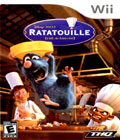Genre: Action/Platformer
Publisher: THQ
Developer: Asobo/Heavy Iron Studios
Release Date: October 23, 2007
I have three children — boys, almost two, and three-and-a-half years; and a daughter, 13 — so I will readily take on for review games created for kids and young teens. There's nothing at all deficient about well-designed children's titles; indeed all-time classics and contemporary innovations are often aimed squarely at the runny-nosed, candy-pilfering set. But for adult gamers, average kids' games rarely rank on the most-anticipated lists.
Ratatouille for the PlayStation 3 is, of course, a movie-license title derived from the hit Pixar Studios animated feature film — must I really describe any Pixar production as "a hit?" Isn't this presumed? — of the same name. It's not only a movie tie-in title, but also a children's movie tie-in title, despite the film itself having broader age appeal. Expectations must be accordingly calibrated. Game adaptations from another moving-picture medium rarely work out well, and these games will sell on the strength of the license alone, especially if the movie does good box office and/or home video sales. Again, with Pixar properties, that's heretofore a default proposition. Strictly in business terms, the game will sell to cover development costs and likely make a tidy profit. And, presumably, the publisher paid a not insubstantial sum for the exclusive game license, and there may also exist a royalty agreement per units sold.
Still, this doesn't absolve the publisher or developer of these games — in this case, THQ and Heavy Iron Studios, respectively — of the responsibility to try, within the constraints of budgets and schedules, producing an at least mildly entertaining game, and certainly not unleash a purely infuriating, hobbled slap-up job. A good recent example is Electronic Arts' latest Harry Potter licensed movie tie-in, Order of the Phoenix. For most adults, even some teens, the gameplay through the first half of the title is just a flat-out hair-pulling grind. In the second half, where the real action kicks in, it's hardly worth having gone through the first part to get there. But for the title's target audience, the core Harry Potter fans roughly between ages eight and 12, what is for an adult an exercise in tedium is no doubt at least somewhat as magical as the book phenomenon's fictional young wizards. To wit: EA didn't make a great game, perhaps barely a good game, but they surely tried and to some degree succeeded in creating a title that appealed most directly to its intended audience. The folks at THQ should phone up their peers at EA, ask lots of questions and take even more notes.
The Ratatouille game is divided in two parts. First, a story mode that loosely follows the film's plot to the degree that you help Remy, a rat with human characteristics, realize his dream of becoming a renowned Parisian chef — a rather unusual goal, even for a French rat. It's a cute enough plot for a movie aimed at children, and it was further scripted and directed for appeal across a broader age range. But it's a weak device for a platform video game: It's tantamount to a ransacked RPG quest, ultimately terminating in a quirky but unexciting goal, achieved, should you possess the patience of an aged Zen monk, by completing tasks within game sub-levels in order to unlock access to more sub-levels, where again you slog through more rote tasks, eventually moving that much closer to the realm of haute cuisine in the City of Light. If the individual mission tasks held any particular interest, were designed in any comprehensible or motivating manner, you might at least have a game a child would play for a couple of weeks, maybe even finally completing it, enjoying the experience as long as he sticks with it.
But the tasks Remy must perform aren't the least bit inspired: At the outset, the big push for Remy is washing up before handling food. Is this a video game or a hygiene lesson? Worse, the game's controls are seemingly randomized; proper button pushing in one instance yields the expected, succeeding result, but before the next checkpoint-esque save position, should Remy expire, the player must repeat some earlier portions of the current mission. Uusing the same perfected accuracy of action timing, however, poor Remy doesn't make it the second, third or fourth time.
Even worse, there are, as there often are with platformers of this ilk, automated camera perspective problems: It's the same sad story; you can easily see what you need to see when you need to see it — and in Ratatouille there is no perspective-centering or functional manual camera manipulation. This, combined with the hideous control implementation, creates long, repeated moments of agonizing frustration.
Yet even worse, there's very little direction or instruction about the natures of the required tasks or how, exactly, to complete them. There are a few text windows explaining the SixAxis technicalities of performing specific actions. Repetitive, brief in-game voice sometimes reminds the player of an important task. But the overarching goal in each environment is explained in brief cut scenes for which no subtitles are available, and here's where the title really tips into the abyss: At key points, the game relies on these cut scenes to convey information to the play, so that he's not running rat amuck guessing what he's supposed to do while moving ahead.
Within the Dolby Digital audio format in some of the cut scenes, while you'll hear music and some audio effects, the voice track frequently cuts out — likely, the voice dialogue track is placed solely on the center channel, and the discrete digital center channel signal just drops. You can solve the problem by switching the audio processing on your television or A/V receiver to an analog setting; mono works just fine, and you won't miss anything here, as Ratatouille is hardly a triumph in digital surround. You can, sometimes, switch back from an analog mode to Dolby Digital, in the process restoring the main voice track. Sometimes. The obvious show-stopper here is that without the voice track, save a peculiar player's unusual ability to read animated rat lips, no one will have much idea what he's supposed to do in certain segments of the game. Granted, switching to an analog audio mode is a workaround, but PlayStation 3 not only supports discrete-channel digital sound, its games' audio is based on this format. It's a feature! Developers of games for PS3 must assume their audience absolutely will play their game in the featured audio format.
The second part of Ratatouille contains a rather large selection of mini-games, about 16 or so. Unfortunately, almost each and every one is an affront. Several of them are almost imperceptibly reworked scenes from the story mode. The original mini-games are dull, frustrating or, not infrequently, both — and of course you'll have trudged through some of the same gigs in story mode just to unlock a repeat in the mini-games. As the game opens, the mini-games are locked, requiring you play the virtually unplayable story mode in order to unlock them.
Except for HD resolution support, Ratatouille's graphics are late-generation PlayStation 2 quality, and not a particularly good example of end-of-life PS2 graphics, either. For a game of this type and its intended youthful audience, graphics aren't necessarily paramount, but the title is based on a film animated by a studio famed for its amazing achievements in computer-modeled, animated film graphics. The ho-hum graphics do matter in Ratatouille; they are far, far worse than those of the film, though they need not be so poor.
For children, say, between ages two and five, after having watched the film on DVD perhaps 147 times, they'll probably get some small to moderate enjoyment out of merely moving around Remy, that funny movie rat, via the SixAxis controller, making him jump here and there, or perform a whirling tail-spin maneuver. But the audience for this game is older, six to perhaps as old as 12; children in this age range, although typically quite tolerant of pointless repetition of failed sequences in video games, simply won't bear the almost entirely absent direction or instruction on the point of what to do next. The appalling control scheme may drive them quite mad. It's a good thing the title is available at an off-price compared with other current-generation titles, as parents of age-target children who stick with this game for more than a couple of hours should save the money for their kids' future psychotherapy sessions.
I don't know anyone at Heavy Iron Studios, but I do know that deep down, most game developers believe their creations, these games of almost any genre or inspiration, are an art form, even if they'll admit, often a very commercial brand of art. Creators of games this poor, reckless and careless aren't artists, and they have no rights in alleging art as their professions. If they cared one bit about games or stake any fair claim in artistry, they'd have stayed up nights days on end to improve this game. Frankly, developers of this type perform a gross disservice to other practitioners of the medium, and THQ should have never let this one out the door, no matter how much revenue they'll earn in licensed sales. With titles so poor, they severely weaken their credibility even in the eyes of young, naïve, rather readily pleased gamers; the quick cash is just not worth the huge swath of a black mark on their industry reputation.
Score: 4.5/10
More articles about Ratatouille











 Ratatouille offers a fresh and exciting take on the platform action genre, engaging players in deep, fluid, and fast gameplay through fun filled mini-games, daring heists, frenzied pursuits and wild chases, providing constant fun and challenge.
Ratatouille offers a fresh and exciting take on the platform action genre, engaging players in deep, fluid, and fast gameplay through fun filled mini-games, daring heists, frenzied pursuits and wild chases, providing constant fun and challenge.























